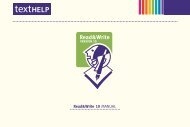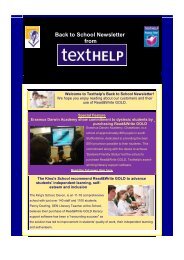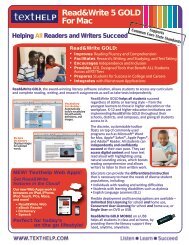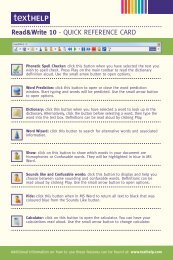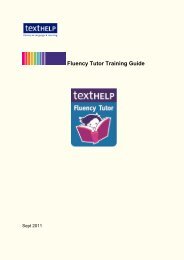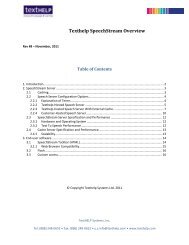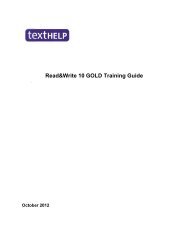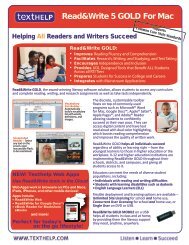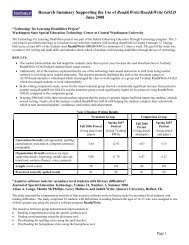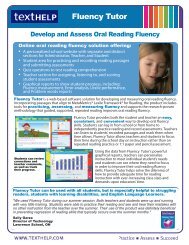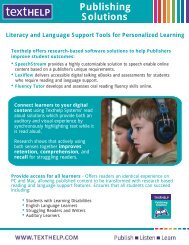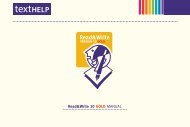01 NRDC Dyslexia 1-88 update - Texthelp
01 NRDC Dyslexia 1-88 update - Texthelp
01 NRDC Dyslexia 1-88 update - Texthelp
Create successful ePaper yourself
Turn your PDF publications into a flip-book with our unique Google optimized e-Paper software.
138<br />
Research Report<br />
Note 2 The committee stipulated that a working definition ‘should be descriptive (with no<br />
explanatory elements), specific enough to identify dyslexia within the whole of severe<br />
reading and spelling problems, general enough to allow for various scientific explanatory<br />
models and developments those models might undergo, operationalisable for the<br />
purposes of research into people and groups, directive for statements concerning the<br />
need for intervention and finally, applicable to the various groups involved’ (page 209).<br />
Note 3 The authors, who were secretary and chairman of the committee, add that ‘In all<br />
cases a partial (and sometimes principal) role is played by a person-bound factor ‘ (page<br />
209).<br />
Hornsby, B. (1995). Overcoming <strong>Dyslexia</strong>: a straightforward guide for families and teachers.<br />
(Second ed.). London: Optima.<br />
Perhaps the simplest modern definition of dyslexia is that it is difficulty in learning how<br />
to read and write—particularly in learning to spell correctly and to express your thoughts<br />
on paper—which affects those who have had normal schooling and do not show<br />
backwardness in other subjects. This definition is helpful in so far as it describes what<br />
every dyslexic has in common, but it does not tell the whole story (page 3).<br />
Note ‘ … the presence of literacy problems should no longer be regarded as a necessary<br />
condition for a diagnosis of dyslexia’ (Abstract). Miles, T. R., Wheeler, T. J. and Haslum,<br />
M. N. (2002). <strong>Dyslexia</strong> without literacy problems? (Unpublished manuscript).<br />
Klein, C. (1993). Diagnosing <strong>Dyslexia</strong>: a guide to the assessment of adults with specific<br />
learning difficulties. London: Adult Literacy & Basic Skills Unit.<br />
In this book both [‘specific learning difficulties’ and ‘dyslexia’] are used interchangeably<br />
to refer to written language processing difficulties affecting visual, auditory and/or motor<br />
processing in reading, writing and spelling (page 5).<br />
Note 1 ‘If the term dyslexia were to be taken as synonymous with specific reading<br />
difficulties, then the overlap between the groups would be more considerable than the<br />
cognitive analysis of their difficulties suggests. The use of the two terms interchangeably<br />
is therefore misleading’ (pages 597–598). Snowling, M., Bishop, D. V. M. and Stothard, S.<br />
E. (2000). ‘Is preschool language impairment a risk factor for dyslexia in adolescence?’<br />
Journal of Child Psychology and Psychiatry, 41(5), 587–600.<br />
Note 2 ‘<strong>Dyslexia</strong> is a generic term typically used to refer to children who are severely<br />
impaired in reading. It is also known as specific reading disability, the two terms being<br />
used interchangeably’ (page 7). Vellutino, F. R. (1979). <strong>Dyslexia</strong>: theory and research.<br />
Cambridge, MA: MIT Press.<br />
Critchley, M. and Critchley, E. A. (1978). <strong>Dyslexia</strong> Defined. London: Heinemann Medical Books.<br />
Developmental dyslexia [is] a learning disability which initially shows itself by difficulty in<br />
learning to read and later by erratic spelling and by lack of facility in manipulating<br />
written as opposed to spoken words. The condition is cognitive in essence and usually<br />
genetically determined. It is not due to intellectual inadequacy or to lack of sociocultural<br />
opportunity, or to emotional factors, or to any known structural brain defect. It



